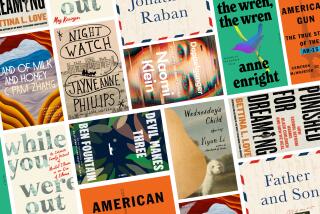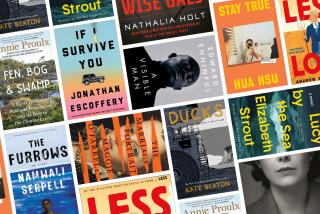Discoveries
- Share via
Who Defended
the Country?
A New Democracy Forum
on Authoritarian versus
Democratic Approaches
to National Defense on 9/11
Elaine Scarry
Beacon Press: 114 pp., $13 paper
“While we continue to lament the deaths and injuries,” writes Elaine Scarry in her provocative essay, “Who Defended the Country?,” “one thing must be stated in a clear sentence: on Sept. 11, the Pentagon could not defend the Pentagon, let alone the rest of the country.”
The technological realities of war, particularly nuclear war, call for a speed in decision-making that precludes some of the fundamental principles of democracy. Scarry, here and elsewhere, is searching for a more democratic approach to national security, and she finds her model in the two scenarios provided by the fate of American Airlines Flight 77 (which crashed into the Pentagon) and United Airlines Flight 93 (which crashed outside of Pittsburgh) on the morning of Sept. 11. “The military was unable to thwart the action of flight 77 despite fifty five minutes in which clear evidence existed that the plane might be held by terrorists.” “In 23 minutes,” she reasons, “the passengers of flight 93 were able to gather information, deliberate, vote, and act.” “The egalitarian model,” writes Scarry, had the advantage of “swiftness, as well as obvious ethical advantages.”
Scarry wants us to think more and deeper about national security and our responsibilities as citizens. This is a debate survivors have the luxury of engaging in, and perhaps the duty as well. It cuts deeper than any news flash or TV talk show ever could.
*
Jesus Christs
A Novel
A.J. Langguth
Figueroa Press/USC University
Bookstore: 227 pp., $12.95
Jesus opens his sealed manila folder to read his instructions for life in the modern age. “Nothing above cabinet rank unless the population is less than three million. Avoid Roman Catholic, Lutheran and Methodist denominations. Be scrupulous in registering for the draft and paying overtime parking tickets. College teaching only as a last resort.”
In this demonically funny novel, written in 1968, Langguth weaves between seriously inspirational and just plain silly, approaching the life of Christ in a most Shakespearean manner, down to the last pun and the last jab at patronage. Heaven is a kind of university; Satan is expelled. Jesus bears the burden of his handsomeness; the women always give him trouble. He must live to see his teachings perverted and misused by believers and zealots alike. His mother Mary is an overbearing proselytizer.
Langguth tests the strength of the form with humor and history and metaphor and irony until it almost bursts into theater.
*
First Loves
A Memoir
Ted Solotaroff
Seven Stories Press:
272 pp., $24.95
You can picture him. Almost 20, just back from World War II, headed for the University of Michigan. Not as ugly as he thinks he is but not as good-looking as he pretends to be. Ted Solotaroff has written a memoir that parents might actually give to their young adult, headed into the world. He has a goal -- to study labor law -- that springs mysteriously and not so mysteriously from his childhood as the son of a single mother who worked as a bookkeeper late into the night so he and his siblings could go to school and play basketball.
And he has fun, from a summer at the Lido Beach Hotel, “a big swanky Jewish family resort that towered chateaulike over its vast Long Island domain of pools and cabanas,” to college conversations on “Daisy Miller” and Ezra Pound. These are the years of Leslie Fiedler, Irving Howe and Alfred Kazin, of “the sudden importance of Jews in American letters.” These were the years when relationships were less important than intellectual integrity, and great prices were paid by children and lonely poets alike. Welcome to Solotaroff’s world, full of lust, craving and camaraderie; surprisingly free of bitterness and sweetened by regret.
More to Read
Sign up for Essential California
The most important California stories and recommendations in your inbox every morning.
You may occasionally receive promotional content from the Los Angeles Times.













